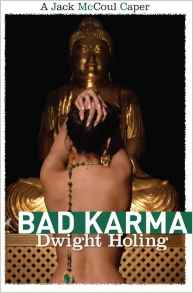Dwight Holing is the author of the new mystery novel Baby Blue, the third in his Jack McCoul series. His other books include Bad Karma and A Boatload. He lives in California.
Q:
How did you come up with your character Jack McCoul, and did you know you'd be
writing a series from the beginning?
A:
I’d been writing short fiction for literary journals and wanted to mix it up as
I believe crossing genres keeps a writer fresh. Since crime fiction has always
occupied a prominent section of my own library, I gave it a go.
The
result was a humorous story about a quick, hip, and shoot-from-the-lip con
artist trying to go straight who is a composite of various real life people
I’ve known. It was published in Spinetingler Magazine.
Halfway
through writing it, I realized Jack McCoul was just too fun to let go. Or at
least he conned me into believing he could play on a larger stage.
Q:
How do you think the character has changed since the first book?
A:
One of the unwritten rules of the traditional private eye genre I broke was making
Jack McCoul happily married. Not only does this imbue the murder mystery series
with the give and take between lovers, but allows the characters to grow organically
as they build a life together and start a family. Evolution reveals new layers
of their personalities.
Also,
having a protagonist who dwells on both sides of the law allows me to delve deeper
into different themes, including crime and punishment, guilt, temptation,
injustice, and social mores. As both a writer and a reader, I find few things
are as rewarding as when characters find self-awareness through their actions.
Q:
Do you know how your novels will end before you start writing, or do you make
many changes along the way?
A:
I begin by arcing the story out by scenes, but I never let those box me in.
They’re moveable road signs. The series has several reoccurring characters
whose relationships and dialogue help set the tone and drive the pace.
New
characters, whether villain or victim, determine the plot. There’s an old
cliché in writing that you never close the door on any character. It’s trite
but true. You gotta let ’em run. At the same time, I keep in mind what Faulkner
said about killing your darlings.
Q:
You've also written short fiction and nonfiction. Do you have a preference?
A:
I like both and still do both. Nonfiction certainly works its way into both my short
and long fiction. The Jack McCoul series is set in San Francisco and I love to share
with readers its colorful history and quirky nature.
Characters,
conflicts, and cool stuff inhabit the environmental issues, life sciences, and
outdoor adventures I’ve written about, and so I let the natural world be a
source and inspiration for stories.
Wildlife,
weather, landscape – they all play an integral role in a narrative’s arc and
protagonist’s journey, providing action, motivation, and revelation.
Q:
What are you working on now?
A:
Jack, his wife Katie, and buddy Hark still have unfinished business and they’re
bringing me along on their latest ride, Shake City. I plan to share the newest
caper with readers this spring.
I’m
also developing a new collection of short fiction. Most are new pieces; a
couple, such as “A Pale Chanting,” have been published previously in literary journals.
Nonfiction? There’s a documentary screenplay in the works.
Q:
Anything else we should know?
A:
We’re all storytellers at heart. It’s what defines us as a species. Tell yours,
listen to others.
--Interview with Deborah Kalb




No comments:
Post a Comment